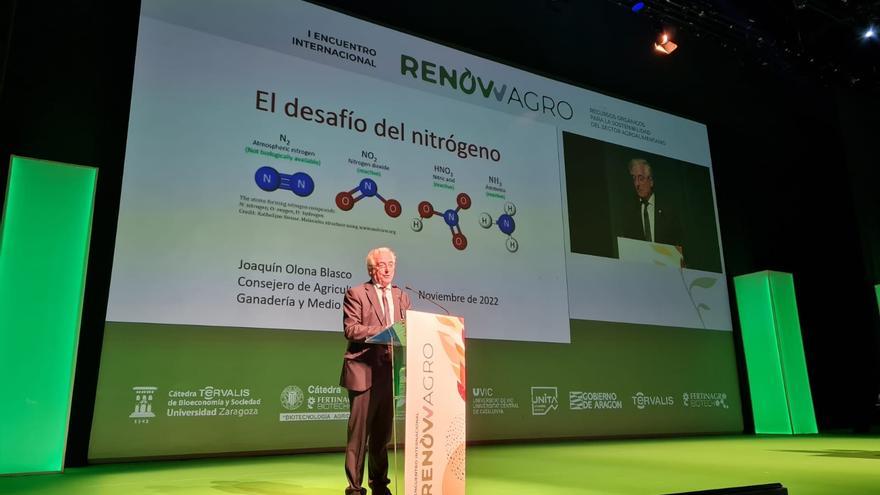What is your opinion on the international meeting I RenowAgro?
The congress was very positive because it demonstrated that the aim that we have promoted by the government of Aragon in recent years is perfectly possible. There is a scientific and even technological basis and a whole ecosystem of knowledge of companies and agents who are not only interested in the project, but also see a solution in it. It is a question of transforming manure and sewage into fertilizers with the aim of replacing conventional mineral fertilization with resources that we have at our disposal and which, moreover, on an economic level, will be able to reduce costs.
Aragón has made clear his willingness to lead the transition from the use of mineral to organic fertilizers. What steps have been taken by the government of Aragon and with what deadlines are they working?
It’s not something we’ve started now. This started a long time ago, and already in 2019 a decree on sewage was passed which established the regulatory basis within what an autonomous community can do. It is a path we have traveled and we still have a long way to go. It is difficult to set dates for this project because it largely depends on the will of the livestock and agricultural sector itself, but we have the security and conviction to continue working on it. We have verified the validity of what has been stated.
The need to implement this path starting from public-private collaboration has also emerged. Which allies or actors need to be added?
Apart from the industry, which has already expressed its will through Térvalis, there are mainly two players that should be there: livestock companies, especially in the pig sector, and the farmers themselves. In this case, a very important role is played by the cooperatives which, on the one hand, bring together mainly 50% of Aragonese farmers and, on the other, supply fertilizing products.
President Lambán spoke of the need to promote spaces and seek formulas of understanding between the agricultural and zootechnical worlds. How can this cooperation be facilitated?
While traditionally there is some tension between ranchers and farmers, in the confrontation itself there is a solution. The farmer has slurry, which is a nitrogen resource that is necessary for farmers, but which is a problem for him. Thus, with this new model, livestock could dispose of this waste by offering it to farmers as a fertilizing solution.
We’ve talked about a change of model, but it’s also about a paradigm shift, about advancing the relationships between manufacturers so that what one has advanced can be used by the other.
His speech at the meeting focused on the challenge posed today by the use of nitrogen, an element necessary for agriculture but which in turn contaminates soils and water bodies. What is this challenge about?
Nitrogen itself isn’t a problem, it’s a solution. 78% of the air we breathe is nitrogen, an essential element for producing food. Another thing is the process of obtaining and applying it.
The problem arises when, in addition to fertilizers obtained from sewage, fertilizers are produced using industrial methods; Either we get rid of the slurry, or we get rid of the mineral fertilizers. Getting rid of sewage is not feasible because it would mean eliminating livestock, which is clearly not the solution proposed by the Aragon government. We have to bet on the use of nitrogen in the form of slurry and manure that we already have and do without imported nitrogen. In this way, the environmental problem present in soils and water bodies is also addressed.
What projects are being developed in Aragon in this line?
The most notable project, presented at the international meeting, is Circular Nitrogen (N-Circular), for which the Comarca de las Cinco Villas was chosen. A pilot program proposed to test the process that we want to extend to all of Aragon as soon as possible.
In short, the ultimate goal is to promote the sustainability and self-sufficiency of the agri-food sector. The current international context has highlighted the problems generated by dependence on other countries. Can Aragon be self-sufficient and autonomous in terms of agri-food?
Yes. From our point of view, with a fundamental element like nitrogen, we can and must be completely self-sufficient. Aragon must work for this independence because otherwise we will have a much more serious environmental problem. Furthermore, it assumes both an element of competitiveness and economic feasibility, and of environmental sustainability.
Is it possible to be self-sufficient in terms of fertilizers?
Organic fertilizers are the first step, obviously taking into account their quality. The meeting discussed the need for them to be subjected to the necessary checks for the good of production and of society itself and that they are not polluting elements.
It is a very ambitious project that can bring great benefits, how was its preparation possible?
To carry out this transition process, technologies provided by the Térvalis group are needed, which, from the Government of Aragon, is grateful for its great collaboration with the award of several patents. With this, they have demonstrated their willingness to accelerate this process, contributing something valuable such as knowledge and techniques that have already been developed in which they have invested a lot of time and money and which will allow us to avoid having to go down paths already traveled. Being a private company, it is fair to acknowledge their work and their great generosity.


